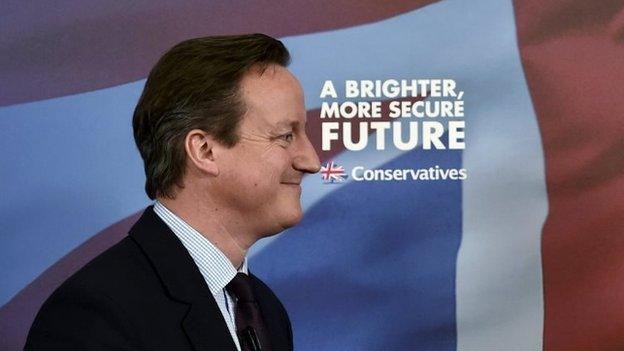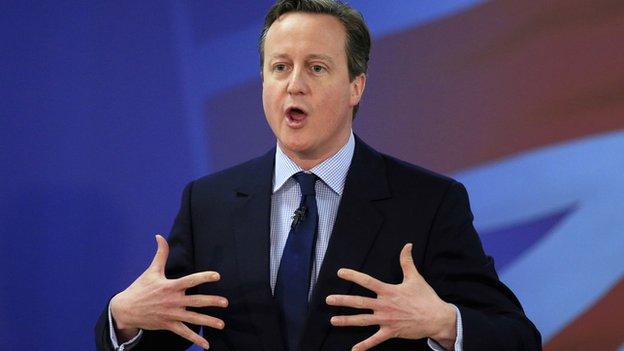English votes for English laws 'fully revived'
- Published

A previous Conservative leader once told me a story. The narrative concerned the stump speech which said leader was deploying at the time. This was, I emphasise, a wee while back.
The speech, as delivered in town halls around England, generally went like this. "We are the party of low taxation". Polite applause. "We intend to be in Europe but not run by Europe". Polite applause with some notable abstentions. "We are the party of English votes for English laws." Loud applause, roof in danger.
Said leader tried this repeatedly, with the same result. But said leader also slowly concluded that, at the time, EVEL was perhaps a little too hazardous, too inclined to sow disquiet within the very United Kingdom the Tories were aiming to protect.
Every Conservative leader since John Major has entered office, determined to answer the West Lothian question. Every Conservative leader since John Major has subsequently shelved the idea. Until now.
'Irritating question'
David Cameron, at first, was no different. Early zeal for reform ended up, not long after he became leader, with a speech in Edinburgh in which he argued: "Better an imperfect Union than a perfect divorce."
To be fair, things have changed substantially. In two ways. Firstly, the constitutional arrangements of the UK are different and are about to alter still further. Secondly, the political challenge confronting the Conservatives has shifted materially with the emergence of UKIP.

In days gone by, the answer generally given to the West Lothian questions by senior politicians - from Labour and other parties - was: "Would you please stop asking such an irritating question?"
Given that this was, in the first instance, aimed at the estimable Tam Dalyell, the erstwhile MP for West Lothian, the chances of success were minimal. Tam, to his enormous and enduring credit, made a career out of asking irritating questions with admirable persistence.
Like a dripping tap or a remote drain with a faint, but pungent, aroma, the West Lothian q. has hung around Scottish politics ever since Tam first drew attention to it in the 1970s.
It has now been fully revived by the prime minister with a pledge to introduce English Votes for English Laws within 100 days, should he be returned to power. The change would be enforced in time for the 2016 Budget.
Bolster the SNP
Is David Cameron motivated by electoral reasons? You bet he is. But, then, this is an election. Politicians of every hue are seeking issues which will attract voters to their side - and cause them to shun the other lot.
Mr Cameron makes two calculations. One, that an emphasis upon English voting rights may undermine the appeal of UKIP south of the Border.
And, two, that spotlighting the constitution might tend to bolster the SNP in Scotland to the disadvantage of the Labour Party. For a Tory leader, what's not to like?
Mr Cameron's rivals provide a range of responses. The SNP says that it will still tend to abstain at Westminster on issues which are, genuinely, of relevance to England only. However, it notes the practical difference thereby attached.
This is that even a health bill covering England may have an impact upon Scotland - either because it will bring about Barnett spending consequentials or because, by deploying the private sector, it may reduce such associated cash transfers.
Plus, of course, the small point that, if the SNP are to play a role in the governance of the UK, then they must be prepared to vote fairly regularly. They would not be much use as partners in the Commons if they constantly abstained.
Mature consideration
In addition, the SNP accused Mr Cameron of breaching the spirit and the terms of the Smith Commission agreement to the effect that Scottish MPs would continue to vote on UK tax matters. The Tories say MPs from Scotland still will - but at Third Reading, after English scrutiny.
The Liberal Democrats, through the person of Danny Alexander, launched a particularly vituperative attack upon Mr Cameron, accusing him of breaching Smith, of seeking Tory advantage in England and of, thereby, jeopardising the UK.
And Labour? They face a conundrum. They know that there is an elemental appeal in Mr Cameron's argument that EVEL involves basic fairness for the good and sensible people of England. They know this is seductive.
Equally, however, they are reluctant to give ground on a principle which might make it much more difficult for a future Labour Prime Minister to legislate for England, given the division of seats. (The Tories, remember, start this election contest defending but one seat in Scotland.)
They deploy two arguments in response. One, that the Tory plan risks creating two categories of MP, potentially damaging the Union.
And, two, that this issue should be settled, sensibly, via mature consideration after the election - not as a partisan question during the contest.
In my droll moments (yes, they do exist), I was wont to say that the more pressing West Lothian question was: at what point in West Lothian, moving from Glasgow to Edinburgh, do the chip shops stop serving salt and vinegar and start offering salt and sauce?
That question, critical though it is, may now have to await further detailed research, perhaps by a team of hungry interns. The real West Lothian question is back.

- Published24 April 2015
